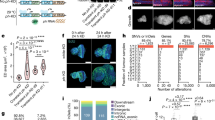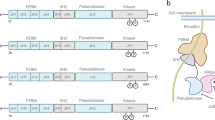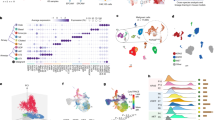Abstract
The major heat shock protein Hsp72 is expressed at elevated levels in many human cancers and its expression correlates with tumor progression. Here, we investigated the role of Hsp72 in Her2 oncogene-induced neoplastic transformation and tumorigenesis. Expression of Her2 in untransformed MCF10A mammary epithelial cells caused transformation, as judged by foci formation in culture and tumorigenesis in xenografts. However, expression of Her2 in Hsp72-depleted cells failed to induce transformation. The anti-tumorigenic effects of Hsp72 downregulation were associated with cellular senescence because of accumulation of p21 and depletion of survivin. Accordingly, either knockdown of p21 or expression of survivin reversed this senescence process. Further, we developed an animal model of Hsp72-dependent breast cancer associated with expression of Her2. Knockout (KO) of Hsp72 almost completely suppressed tumorigenesis in the MMTVneu breast cancer mouse model. In young Hsp72 KO mice, expression of Her2 instead of mammary tissue hyperplasia led to suppression of duct development and blocked alveolar budding. These effects were due to massive cell senescence in mammary tissue, which was associated with upregulation of p21 and downregulation of survivin. Therefore, Hsp72 has an essential role in Her2-induced tumorigenesis by regulating oncogene-induced senescence pathways.
This is a preview of subscription content, access via your institution
Access options
Subscribe to this journal
Receive 50 print issues and online access
$259.00 per year
only $5.18 per issue
Buy this article
- Purchase on Springer Link
- Instant access to full article PDF
Prices may be subject to local taxes which are calculated during checkout






Similar content being viewed by others
References
Altieri DC . (2003). Survivin, versatile modulation of cell division and apoptosis in cancer. Oncogene 22: 8581–8589.
Altieri DC . (2008). Survivin, cancer networks and pathway-directed drug discovery. Nat Rev Cancer 8: 61–70.
Akerfelt M, Morimoto RI, Sistonen L . (2010). Heat shock factors: integrators of cell stress, development and lifespan. Nat Rev Mol Cell Biol 11: 545–555.
Calderwood SK, Khaleque MA, Sawyer DB, Ciocca DR . (2006). Heat shock proteins in cancer: chaperones of tumorigenesis. Trends Biochem Sci 31: 164–172.
Ciocca DR, Calderwood SK . (2005). Heat shock proteins in cancer: diagnostic, prognostic, predictive, and treatment implications. Cell Stress Chaperones 10: 86–103.
Dai C, Whitesell L, Rogers AB, Lindquist S . (2007). Heat shock factor 1 is a powerful multifaceted modifier of carcinogenesis. Cell 130: 1005–1018.
Gabai VL, Budagova KR, Sherman MY . (2005). Increased expression of the major heat shock protein Hsp72 in human prostate carcinoma cells is dispensable for their viability but confers resistance to a variety of anticancer agents. Oncogene 24: 3328–3338.
Gabai VL, Meriin AB, Mosser DD, Caron AW, Rits S, Shifrin VI et al. (1997). Hsp70 prevents activation of stress kinases. A novel pathway of cellular thermotolerance. J Biol Chem 272: 18033–18037.
Gabai VL, Yaglom JA, Waldman T, Sherman MY . (2009). Heat shock protein Hsp72 controls oncogene-induced senescence pathways in cancer cells. Mol Cell Biol 29: 559–569.
Hunt CR, Dix DJ, Sharma GG, Pandita RK, Gupta A, Funk M et al. (2004). Genomic instability and enhanced radiosensitivity in Hsp70.1- and Hsp70.3-deficient mice. Mol Cell Biol 24: 899–911.
Jaattela M . (1999). Escaping cell death: survival proteins in cancer. Exp Cell Res 248: 30–43.
Jolly C, Morimoto RI . (2000). Role of the heat shock response and molecular chaperones in oncogenesis and cell death. J Natl Cancer Inst 92: 1564–1572.
Leu JI, Pimkina J, Frank A, Murphy ME, George DL . (2009). A small molecule inhibitor of inducible heat shock protein 70. Mol Cell 36: 15–27.
Lindquist S, Craig EA . (1988). The heat-shock proteins. Annu Rev Genet 22: 631–677.
Luo J, Solimini NL, Elledge SJ . (2009). Principles of cancer therapy: oncogene and non-oncogene addiction. Cell 136: 823–837.
Meng L, Gabai VL, Sherman MY . (2010). Heat-shock transcription factor HSF1 has a critical role in human epidermal growth factor receptor-2-induced cellular transformation and tumorigenesis. Oncogene 29: 5204–5213.
Min JN, Huang L, Zimonjic DB, Moskophidis D, Mivechi NF . (2007). Selective suppression of lymphomas by functional loss of Hsf1 in a p53-deficient mouse model for spontaneous tumors. Oncogene 26: 5086–5097.
Mooi WJ, Peeper DS . (2006). Oncogene-induced cell senescence--halting on the road to cancer. N Engl J Med 355: 1037–1046.
Mosser DD, Morimoto RI . (2004). Molecular chaperones and the stress of oncogenesis. Oncogene 23: 2907–2918.
Muller WJ, Arteaga CL, Muthuswamy SK, Siegel PM, Webster MA, Cardiff RD et al. (1996). Synergistic interaction of the Neu proto-oncogene product and transforming growth factor alpha in the mammary epithelium of transgenic mice. Mol Cell Biol 16: 5726–5736.
Powers MV, Clarke PA, Workman P . (2008). Dual targeting of HSC70 and HSP72 inhibits HSP90 function and induces tumor-specific apoptosis. Cancer Cell 14: 250–262.
Sherr CJ . (2004). Principles of tumor suppression. Cell 116: 235–246.
Solimini NL, Luo J, Elledge SJ . (2007). Non-oncogene addiction and the stress phenotype of cancer cells. Cell 130: 986–988.
Tang D, Kang R, Xiao W, Wang H, Calderwood SK, Xiao X . (2007). The anti-inflammatory effects of heat shock protein 72 involve inhibition of high-mobility-group box 1 release and proinflammatory function in macrophages. J Immunol 179: 1236–1244.
Tao Y, Hart J, Lichtenstein L, Joseph LJ, Ciancio MJ, Hu S et al. (2009). Inducible heat shock protein 70 prevents multifocal flat dysplastic lesions and invasive tumors in an inflammatory model of colon cancer. Carcinogenesis 30: 175–182.
Trost TM, Lausch EU, Fees SA, Schmitt S, Enklaar T, Reutzel D et al. (2005). Premature senescence is a primary fail-safe mechanism of ERBB2-driven tumorigenesis in breast carcinoma cells. Cancer Res 65: 840–849.
Yaglom JA, Gabai VL, Sherman MY . (2007). High levels of heat shock protein Hsp72 in cancer cells suppress default senescence pathways. Cancer Res 67: 2373–2381.
Zaarur N, Gabai VL, Porco Jr JA, Calderwood S, Sherman MY . (2006). Targeting heat shock response to sensitize cancer cells to proteasome and Hsp90 inhibitors. Cancer Res 66: 1783–1791.
Acknowledgements
This work was supported by grants from the National Institute of Health CA081244. We thank Dr B Park and Dr C Spangenberg for their kind supply of MCF10A cells and HER2-overexpressing retroviral vector.
Author information
Authors and Affiliations
Corresponding authors
Ethics declarations
Competing interests
The authors declare no conflict of interest.
Additional information
Supplementary Information accompanies the paper on the Oncogene website
Rights and permissions
About this article
Cite this article
Meng, L., Hunt, C., Yaglom, J. et al. Heat shock protein Hsp72 plays an essential role in Her2-induced mammary tumorigenesis. Oncogene 30, 2836–2845 (2011). https://doi.org/10.1038/onc.2011.5
Received:
Revised:
Accepted:
Published:
Issue Date:
DOI: https://doi.org/10.1038/onc.2011.5
Keywords
This article is cited by
-
Stress proteins: the biological functions in virus infection, present and challenges for target-based antiviral drug development
Signal Transduction and Targeted Therapy (2020)
-
Cancer cell responses to Hsp70 inhibitor JG-98: Comparison with Hsp90 inhibitors and finding synergistic drug combinations
Scientific Reports (2018)
-
The protein–protein interaction network and clinical significance of heat-shock proteins in esophageal squamous cell carcinoma
Amino Acids (2018)
-
CLEC14a-HSP70-1A interaction regulates HSP70-1A-induced angiogenesis
Scientific Reports (2017)
-
The expression of DAMP proteins HSP70 and cancer-testis antigen SPAG9 in peripheral blood of patients with HCC and lung cancer
Cell Stress and Chaperones (2017)



